

Office Address
- 2nd Floor, #7a, High School Road, Secretariat Colony Ambattur, Chennai-600053 (Landmark: SRM School) Tamil Nadu, India
- [email protected]
- +91- 81240 01111
Social List
Phd research proposal in internet of things [iot proposal].
Trending Research Proposal in Internet of Things(IoT) for PhD
The IoT permits interconnection between physical and virtual smart devices through the Internet. The IoT devices are generally tiny in size and have low power with limited processing capabilities. The devices sense the environmental-related information and forward the sensed information to further processing via gateways. The IoT is a standalone system, whereas it is easily built with conventional technologies to offer various kinds of services. The IoT extends the conventional technologies like wireless sensor networks and radio frequency identification with restricted interoperability to meet the application-specific requirements. The IoT permits communication among smart devices directly or through relay devices. The burgeoning IoT technology provides different novel solutions in diverse IoT applications. Some prime IoT applications are smart agriculture, smart grids, smart industries, smart homes, smart vehicular systems, and smart cities. The Ph.D. proposal in IoT comprises novel ideas in diverse IoT platforms like routing, security, privacy, and application-specific requirements. The IoT is a vast technology that not only assists in tangible individual development, also plays a significant role in growing the economical status of the country. It has more future directions and paves multiple opportunities to the researchers.
- Guidelines for Preparing a Phd Research Proposal
Latest Research Proposal Ideas in Internet of Things
- Research Proposal on Scalability of RPL Routing for IoT
- Research Proposal on DDoS Attack Detection in Internet of Things
- Research Proposal on Identity-based Encryption in Internet of Things
- Research Proposal on Industrial Internet of Things
- Research Proposal on Edge Computing for Industrial Internet of Things
- Research Proposal on Big Data Management for IoT
- Research Proposal on Internet of Vehicles
- Research Proposal on Internet of Everything
- Research Proposal on Internet of Electric Vehicles
- Research Proposal on Internet of Medical Things
- Research Proposal on IoT Cybersecurity
- Research Proposal on QoS in IOT
- Research Proposal on IoT Enabled Business Models
- Research Proposal on IoT with Next Generation Wireless Systems
- Research Proposal on IoT with Edge Computing
- Research Proposal on IoT with Fog Computing
- Research Proposal on IoT with Blockchain Technology
- Research Proposal on IoT with Wireless Sensor Networks
- Research Proposal on Internet of Underwater Things
- Research Proposal on IoT Smart Home
- Research Proposal on IoT Smart City
- Research Proposal on IoT Smart Building
- Research Proposal on IoT Smart Environment
- Research Proposal on IoT Smart Transportation
- Research Proposal on IoT Smart Agriculture
- Research Proposal on IoT Smart Healthcare
- Research Topics in Software-defined networking for IoT
- Research Proposal on Internet of Multimedia Things
- Research Proposal on Energy-efficient network management and control for LPWAN
- Research Proposal on Routing and networking algorithms for LPWAN in IoT
- Research Proposal on Real-time communication and low latency requirements in middleware for IoT
- Research Proposal on Quality and Legal Standards for Digital Forensics
- Research Proposal on Improving scalability in RPL through the use of software-defined networking (SDN) techniques
- Research Proposal on IoEV and Renewable Energy Integration
- Research Proposal on Fog computing for industrial IoT applications
- Research Proposal on 5G-IoT network slicing and virtualization
- Research Proposal on Resource-Efficient Federated Learning for IoT
- Research Proposal on Improving scalability through hierarchical RPL structures
- Research Proposal on Energy-efficient MAC protocols for IoT
- Research Proposal on Network performance evaluation and optimization in LPWAN for IoT
- Research Proposal on Market analysis and adoption trends of LPWAN technologies
- Research Proposal on Deep Reinforcement Learning for Predictive Maintenance in IoT
- Research Proposal on Integration of satellite IoT with terrestrial IoT networks
- Research Proposal on Federated learning for IoT analytics
- Research Proposal on Performance evaluation of MAC protocols for IoT
- Research Proposal on Integration of RPL with blockchain for secure and scalable IoT networks
- Research Proposal on Federated Learning for Anomaly Detection in IoT
- Research Proposal on Development of context-aware 5G-IoT systems
- Research Proposal on Interoperability and standardization in edge computing for IoT
- Research Proposal on Cross-Silo Federated Learning for IoT
- Research Proposal on Enhancing the security of RPL through the integration of blockchain technology
- Research Proposal on Using Multi-RPL for large scale IoT networks
- Research Proposal on Deep Reinforcement Learning for Autonomous Decision Making in IoT
- Research Proposal on Energy sources for LPWAN deployment
- Research Proposal on Autonomous operation and management of satellite IoT networks
- Research Proposal on Security and privacy considerations in routing and networking for LPWAN in IoT
- Research Proposal on Integration of middleware with cloud computing and edge computing for IoT
- Research Proposal on Scalability of RPL in the presence of mobility in IoT networks
- Research Proposal on Real-time Federated Learning for IoT
- Research Proposal on Reliability and Quality of Service (QoS) in 5G-IoT networks
- Research Proposal on Edge computing for autonomous systems and vehicles
- Research Proposal on Interoperability and standardization in fog computing for IoT
- Research Proposal on Topology design and network planning for LPWAN in IoT
- Research Proposal on Deep Reinforcement Learning for Security and Privacy in IoT
- Research Proposal on Interference avoidance and management in MAC protocols for IoT
- Research Proposal on Edge computing in industrial IoT for real-time data processing
- Research Proposal on Smart Charging and Energy Management for IoEV
- Research Proposal on Interference management in 5G-IoT networks
- Research Proposal on Edge computing for data analytics in IoT networks
- Research Proposal on Performance analysis of RPL in large scale and heterogeneous IoT networks
- Research Proposal on Scalable and modular middleware solutions for IoT
- Research Proposal on Performance evaluation and comparison of different LPWAN technologies
- Research Proposal on MAC protocols for resource-constrained IoT devices
- Research Proposal on Real-time data analysis and decision-making in industrial IoT
- Research Proposal on Energy-efficient network and application layer protocols for LPWAN
- Research Proposal on Multimedia Resource Management and Optimization in IoT networks
- Research Proposal on Dynamic Resource Allocation in Federated Learning for IoT
- Research Proposal on Optimizing RPL routing for energy efficiency in IoT
- Research Proposal on Design and analysis of secure RPL routing in heterogeneous IoT networks
- Research Proposal on Power management techniques in LPWAN devices
- Research Proposal on Security and privacy considerations in LPWAN standards and interoperability
- Research Proposal on Dynamic network management and control in LPWAN for IoT
- Research Proposal on Interoperability and standardization efforts for middleware in IoT
- Research Proposal on Integration of MAC protocols with other networking technologies for IoT
- Research Proposal on Using RPL for scalable and secure communication in industrial IoT
- Research Proposal on Energy-efficient communication protocols for 5G-IoT
- Research Proposal on Optimization of the medium access control (MAC) layer for energy efficiency in LPWAN
- Research Proposal on Data privacy and security in IoT analytics
- Research Proposal on Interoperability for MAC protocols in IoT
- Research Proposal on Energy-efficient radio frequency (RF) front-end design for LPWAN
- Research Proposal on Performance evaluation and optimization of IoT analytics solutions
- Research Proposal on Security considerations in middleware for IoT
- Research Proposal on Integration of RPL with other IoT routing protocols for improved scalability
- Research Proposal on Secure bootstrapping mechanisms in RPL for IoT security
- Research Proposal on Edge computing for real-time data processing in IoT networks
- Research Proposal on Deep Reinforcement Learning for Energy Efficiency in IoT
- Research Proposal on Energy efficiency analysis and evaluation of LPWAN solutions in real-world
- Research Proposal on Quality of Service (QoS) and reliability in LPWAN networks for IoT
- Research Proposal on Security considerations in MAC protocols for IoT
- Research Proposal on Deep Reinforcement Learning for Traffic Management in IoT Networks
- Research Proposal on Interoperability between different LPWAN technologies
- Research Proposal on Enhancing RPL with Artificial Intelligence techniques
- Research Proposal on Federated Learning for Distributed Signal Processing in IoT
- Research Proposal on Integration of IoT and edge computing for intelligent systems
- Research Proposal on Fog computing for autonomous systems and vehicles
- Research Proposal on Wireless Charging for IoEV
- Research Proposal on Edge computing for real-time IoT data analytics
- Research Proposal on Multimedia Security and Privacy in IoT systems
- Research Proposal on Quality of Service (QoS) in MAC protocols for IoT
- Research Proposal on Deep Reinforcement Learning for Anomaly Detection in IoT Systems
- Research Proposal on Real-time tracking and monitoring using satellite IoT
- Research Proposal on Applications of IoT analytics in healthcare
- Research Proposal on Integration of energy harvesting techniques in LPWAN devices
- Research Proposal on Multimedia Big Data Processing in IoT
- Research Proposal on Development of IoT analytics platforms and frameworks
- Research Proposal on Design of energy-efficient data transmission schemes for LPWAN
- Research Proposal on Big data and real-time analytics for IoT
- Research Proposal on Energy-efficient and resource-optimized middleware for IoT
- Research Proposal on Federated Transfer Learning for IoT
- Research Proposal on Fog computing for real-time data processing in IoT networks
- Research Proposal on Predictive Maintenance in IoEV
- Research Proposal on Energy-efficient routing and networking in LPWAN for IoT
- Research Proposal on Vehicle-to-Grid (V2G) Integration in IoEV
- Research Proposal on Edge computing for 5G-enabled IoT systems
- Research Proposal on Secure key management in RPL-based IoT networks
- Research Proposal on Security and privacy in 5G-enabled IoT systems
- Research Proposal on Integration of LPWAN with cloud and edge computing platforms
- Research Proposal on Predictive maintenance in industrial IoT
- Research Proposal on Privacy-Preserving Federated Learning for IoT
- Research Proposal on Multi-objective optimization of RPL for improved scalability and energy efficiency
- Research Proposal on the Design of RPL Reliable Objective Function over IoT
- Research Proposal on the Optimal and Dynamic Trickle Algorithm for RPL
- Research Proposal on the Incorporation of Load Imbalance Factor in RPL Rank Measurement
- Research Proposal on the Heuristic Algorithm Based RPL Routing Optimization
- Research Proposal on the Composite of Sigma ETX and Standard Deviation in RPL Routing for IoT
- Research Proposal on the RPL Congestion Control Scheme using Game Theoretic Approach
- Research Proposal on the Mobility Aware Time-Based Trust Scheme for Secure RPL Routing
- Research Proposal on the Ant Colony Optimization for Congestion Control Mechanism for CoAP
- Research Proposal on the Lightweight ECC and DTLS for CoAP Authentication
- Research Proposal on the Fuzzy Logic Based MQTT Security Provision for IoT Networks
- Research Proposal in Class-Incremental Learning for Large-Scale IoT Prediction
- Research Proposal in Federated Learning for Intelligent IoT Healthcare System
- Research Proposal on Deep Learning based Stream Data Imputation for IoT Applications
- Research Proposal in Deep Incremental Learning based Intrusion Detection in IoT Environment
- Research Proposal in Unsupervised Deep Learning-based Anomaly Detection in IoT Environment
- Research Proposal in Deep Learning-based Congestion-aware Dynamic Routing in IoT Network
- Machine Learning Based intelligent Trust Computational Model for IoT Applications
- PhD Guidance and Support Enquiry
- Masters and PhD Project Enquiry
- Cooja Source Code for Internet of Things
- Cooja Project Titles in Internet of Things
- Research Topics in Internet of Things
- PhD Research Guidance in Internet of Things
- Latest Research Papers in Internet of Things
- Literature Survey in Internet of Things
- PhD Thesis in Internet of Things
- PhD Projects in Internet of Things
- Leading Journals in Internet of Things
- Leading Research Books in Internet of Things
- Research Topics in RPL Routing Protocol for IoT
- Research Topics in Industrial Internet of Things-IIoT
- Research Topics in Secure RPL Routing Protocol for IoT
- Research Topics for Congesion Control Mechanisms in COAP Protocol
- Research Topics in Computer Science
- PhD Thesis Writing Services in Computer Science
- PhD Paper Writing Services in Computer Science
- How to Write a PhD Research Proposal in Computer Science
- Ph.D Support Enquiry
- Project Enquiry
- Research Guidance in Internet of Things
- Research Proposal in Internet of Things
- Research Papers in Internet of Things
- Ph.D Thesis in Internet of Things
- Research Projects in Internet of Things
- Project Titles in Internet of Things
- Project Source Code in Internet of Things

The Role of the Internet of Things (IoT) in Transforming the Business Model of Small and Medium Enterprises (SMEs)
Sample Thesis Introduction
Chapter 1: Introduction
1.1. existing research gaps.
With the world becoming more interconnected and the increasing disruptiveness of information technology, the concept of the internet of things (IoT) has become an important research topic (Ehret & Wirtz, 2017, 1). Given the growing acceptability of IoT, organisations are now prompted to adopt IoT solutions to improve and enhance the experience of their customers and clients (Metallo, Agrifoglio, Schiavone & Mueller, 2018, 298). In accordance with Kiel, Arnold & Voigt (2017, 4), IoT crates a network of interconnected physical devices, which exchange data with each other through the internet, allowing enterprises to obtain and use strategic information (Gierej, 2017, 206). The existing marketing literature has shed some light on the effects of IoT on consumer behaviour and its contribution to the creation of new business opportunities (Boyes, Hallaq, Cunningham & Watson, 2018, 1). In contrast, there is no much empirical evidence on how IoT helps companies deal with external and internal challenges by altering their business models (Lu, Papagiannidis & Alamanos, 2018, 285). Considering the uncertainties of IoT as well as the relative novelty of this concept, the significance and importance of business models that allow organisations to shield their customers and clients against external fluctuations and changes should be further investigated. This project contributes to bridging this gap in the literature by providing the reader with a deeper understanding of the opportunities and threats offered by IoT and its role in business model change in the context of small and medium enterprises (SMEs).
1.2. Rationale
The topic of IoT is of particular interest to the researcher due to a range of reasons. One of these causes is that the significance of relationship marketing has dramatically increased with the emergence of IoT (Glova, Sabol & Vajda, 2014, 1122). Today, marketers are striving towards the establishment of long-term relationships with consumers, instead of simply stimulating their intention to buy (Krotov, 2017, 831). The role of IoT in this process is considerable as the internet and mobile devices have being increasingly used for communication purposes by both consumers and businesses (Ehret & Wirtz, 2017, 1). The growing presence of IoT translates into more sophisticated and effective marketing strategies, which tend to use such instruments as neural networks and artificial intelligence (AI) (Kiel et al., 2017, 4). Nonetheless, the literature that examines how companies make use of the technological potential of IoT for organisational design is still fragmented and insufficient (Alexopoulos, Koukas, Boli & Mourtzis, 2018, 880). Another reason for choosing this particular topic is that the pace at which IoT develops makes the majority of standard business models adopted by SMEs unsatisfactory (Metallo et al., 2018, 298). Hence, there is a strong urge to understand how the potential business opportunities and threats created by IoT can lead to reorganisation activities aimed at the SMEs’ business models.
1.3. Thesis Background
IoT research has been predominantly stimulated by the need for convergence in a range of interdisciplinary technologies (Wang & Hsieh, 2018, 28). To get a better understanding of the relationship between IoT and the business model, it is relevant to have a closer look at what constitutes the internet of things. The IoT landscape comprises three major dimensions or environments, namely technological environment, physical environment, and socio-economic environment (Gierej, 2017, 206). The technological environment consists of such elements as hardware, software, data, networking technologies, and integrated platforms, which enable communication and interactions of the objects in the physical environment (Babiceanu & Seker, 2019, 47). In turn, the physical environment is comprised of human and non-human objects that are linked together by means of the previously mentioned elements of the technological environment (Lu et al., 2018, 285). Finally, the socio-economic environment consists of various stakeholders (e.g. consumers, entrepreneurs, legislative bodies, and industry associations) that set requirements, address technical and legal issues, and determine the success or failure of a business entity (Krotov, 2017, 831). By using these dimensions and their elements in combination, SMEs can create new value propositions or business models with the help of IoT. However, the success and effectiveness of these enhanced business models depends on how well organisations address IoT-driven threats that exist in the external environment (Boyes et al., 2018, 1). These threats can include challenges of information and data reliability, potential market disruption by new competition, intellectual property risks, and safety and security issues (Ehret & Wirtz, 2017, 1).
1.4. Aim and Objectives
Based on the identified research and literature gaps, the main purpose of this doctorate project is to explore the role of IoT in transforming the business model in the context of SMEs. The research objectives are:
- To examine the key elements of the IoT landscape and connections between them.
- To identify the role of IoT in the value creation process in the context of SMEs.
- To explore the impact of IoT on SMEs’ business models.
- To investigate SMEs’ response to business opportunities and threats generated by IoT.
- To provide SMEs’ management with recommendations on what particular improvements could be introduced to their business model to make it more responsive to the recent IoT trends.
1.5. Suggested Methods
This doctorate project employs a mixed method approach, which is justified by the fact that no sufficient research on the relationship between IoT and business models in the contexts of SMEs exists (Kiel et al., 2017, 4). The sample was drawn from 250 managers and owners of UK-based SMEs. Semi-structured interviews with these individuals formed the principal source of empirical data (Merriam, 2015, 134). While collecting data occurs in a structured manner, this technique still allows for following the principle of openness (Howell, 2012, 93). In turn, the researcher employed self-administered questionnaires to explore what elements of the IoT landscape the sampled SMEs use the most. In addition, this technique helped the researcher investigate the respondents’ perceptions of the key opportunities and threats created by IoT (Lo & Campos, 2018, 10). The researcher performed sampling by using the non-probability convenience sampling technique, thereby allowing for collecting data in a fast and efficient manner (Pruzan, 2016, 79). By contrast, the use of this technique could negatively influence the generalisability of the obtained empirical findings (Bryman & Bell, 2010, 142).
Alexopoulos, K., Koukas, S., Boli, N. & Mourtzis, D. (2018). “Architecture and development of an Industrial Internet of Things framework for realizing services in Industrial Product Service Systems”. Procedia CIRP , 72(1), 880-885.
Babiceanu, R. & Seker, R. (2019). “Cyber resilience protection for industrial internet of things: A software-defined networking approach”. Computers in Industry , 104(1), 47-58.
Boyes, H., Hallaq, B., Cunningham, J. & Watson, T. (2018). “The industrial internet of things (IIoT): An analysis framework”. Computers in Industry , 101(1), 1-12.
Bryman, A. & Bell, E. (2010). Business research methods . 3 rd ed., Oxford: Oxford University Press.
Ehret, M. & Wirtz, J. (2017). “Unlocking value from machines: Business models and the industrial internet of things”. Journal of Marketing Management , 33(1-2), 1-20.
Gierej, S. (2017). “The framework of business model in the context of Industrial Internet of Things”. Procedia Engineering , 182(1), 206-212.
Glova, J., Sabol, T. & Vajda, V. (2014). “Business models for the internet of things environment”. Procedia Economics and Finance , 15(1), 1122-1129.
Howell, K. (2012). An introduction to the philosophy of methodology . London: SAGE.
Kiel, D., Arnold, C. & Voigt, K. (2017). “The influence of the Industrial Internet of Things on business models of established manufacturing companies–A business level perspective”. Technovation , 68(1), 4-19.
Krotov, V. (2017). “The Internet of Things and new business opportunities”. Business Horizons , 60(6), 831-841.
Lo, F. & Campos, N. (2018). “Blending Internet-of-Things (IoT) solutions into relationship marketing strategies”. Technological Forecasting and Social Change , 137(1), 10-18.
Lu, Y., Papagiannidis, S. & Alamanos, E. (2018). “Internet of Things: A systematic review of the business literature from the user and organisational perspectives”. Technological Forecasting and Social Change , 136(1), 285-297.
Merriam, S. (2015). Qualitative research: A guide to design and implementation . Chichester: John Wiley & Sons.
Metallo, C., Agrifoglio, R., Schiavone, F. & Mueller, J. (2018). “Understanding business model in the Internet of Things industry”. Technological Forecasting and Social Change , 16(1), 298-306.
Pruzan, P. (2016). Research Methodology: The Aims, Practices and Ethics of Science . New York: Springer.
Wang, Y. & Hsieh, C. (2018). “Explore technology innovation and intelligence for IoT (Internet of Things) based eyewear technology”. Technological Forecasting and Social Change , 127(1), 281-290.
February 5th, 2020
Internet of Things IoT Dissertation Topics
Controlling all devices by connecting them to a common network is called the internet of things. Devices are programmed to control and operate them. By choosing an innovative IoT Dissertation Topics , you can learn a lot more about latest trending technology in internet of things. Making IoT is your research area can fetch you great scope for MS thesis writing . To make your work easy we are here providing you with all the basic ideology to start with your PhD MS IoT Research work . Let us first start with the advantages of the Internet of things.
What are the benefits of IoT?
- The major advantage of the internet of things is the devices that can be connected to a network. Any device and anything can be connected to form IoT.
- Both to and from communication is possible with IoT. So messages can be passed in one-hop or multi-hop communication.
- Distance range does not matter in IoT. It can be used to communicate from anywhere to any place.
- People can stay connected at any time and in context with anyone across the globe.
- It improves homogeneous and heterogeneous data collection support for IoT users
These advantages of IoT make it an unavoidable technology of today . We have nearly 9+ years of experience in guiding research projects on the Internet of things . So we have been traveling with its journey of advancement since its beginning. We are providing world-class research guidance for any type of research as real-time or application-type projects. Here we give you a list of trending IoT Dissertation Topics .
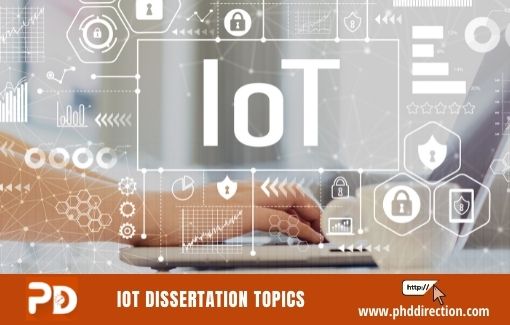
MS THESIS IDEAS IN IOT
Here is a list of IoT research topics that you can refer to for writing your MS thesis on the internet of things .
- Context-driven intelligence
- Distributed AI for IoT
- Security and Privacy for IoT AI
- Fight Against COVID-19 using AI
- Machine learning for Devices
- Use of IoT/ AI to fight COVID-19
- AI for Low power IoT devices
- Embedded AI with IoT architecture
- Edge Computing with IoT using AI
- AI for IoT edge computing
- Data Analytics over Edge Computing
IoT with 5G and beyond
- Software-defined networking solutions
- Critical and URLLC
- Multiple access networks and network backhaul
- Blockchain solutions
- Energy efficiency and wirelessly powered
- 6G-enabled IoT
- Cooperative communication techniques
- IoT architecture with 5G and beyond networks
- Massive connectivity
- IoT short-range communications
- Efficient resource allocation schemes, QoS, and QoE
- IoT security of smart sustainable cities
- Contact tracing to fight against COVID 19
- Cryptography, key management, authentication and authorization
You can either start with any of these topics if you are interested in IoT. These are the most trending research areas in IoT . For any help in choosing the innovative IoT Dissertation topics , you can call us from anywhere at any time. Our best technical team is ready to support you all the time for 5g Master thesis. We have provided brief ideas on different simulation tools for IoT that we used before to develop real-time IoT projects . These can definitely aid you in writing your thesis on the Internet of things .
SIMULATION TOOLS FOR IOT
You can refer to the following simulation tools to know about our vast knowledge attained through research guidance that we rendered across the world.
- Active MessageC algorithm broadcasts messages in TOSSIM simulation. For instance, wireless sensors are connected into IoT and used in electrical appliances of real houses.
- MST Algorithm establishes communications between client and server simulated using Cooja. By Contiki OS low power IoT devices are controlled for home automation.
- Network design in NetSim includes Routers, AP, Nodes, switches, 6LoWPAN Gateway and Sensor Motes. IEEE 802.15.4 standards perform interpretation of physical layer. It uses M/D/1 queue model, IPV4 and IPV6. AODV (RFC 3561), 6LoWPAN Gateway and RPL (RFC 6550) are used in routing.
- A number of MQTT clients are simulated in a single box using BevyWise IoT Simulator. The data and messages are stored in MYSQL database. They are reused for scheduling in Narrow based IoT.
- PureEdge simulation toolkit is used for IoT project by load balancing algorithm. Cloud, Edge computing and Fog are successfully simulated with this tool.
- Geo-fog paradigm project using many sensors is simulated with QualNet IoT toolkit. For instance, Home automation IoT project using ZigBee is simulated with QualNet. In this project, standard mathematical structure and K* heuristic algorithm are used for searching the optimal path during emergency.
- This modeller supports wide variety of protocols for HetNets project simulation. For instance, Project of Opnet on the basis of Zigbee protocol involves KCN routing protocol and OPNET TIREM for route selection and propagation respectively.
These are the various simulation tools that we used in developing various real-time IoT projects . Our world-class certified engineers will assist you completely throughout your research IoT Dissertation Topics. We provide you scam-free, reliable, and the most professional research guidance . With our total experience gained in guiding research projects in IoT , here we suggest you the best solution to any problem that you face during your research journey. Below is our answer to one such question.
HOW TO AVOID PLAGIARISM IN MS THESIS?
To avoid plagiarism in your thesis writing in IoT , you should be more careful. But it becomes easy when you bear the following points in your mind.
- Spend more time collecting resources on your topic
- Before beginning to write have a well-charted plan
- Mention the sources
- Materials cited properly
- References have to be added
- A checker of plagiarism has to be used.
Hope you are now convinced to start with your IoT dissertation Topics . Contact us for any of your doubts regarding the selection of the topic if you have other novel ideas. We will provide you with all the necessary and reliable resources to proceed.
Why Work With Us ?
Senior research member, research experience, journal member, book publisher, research ethics, business ethics, valid references, explanations, paper publication, 9 big reasons to select us.
Our Editor-in-Chief has Website Ownership who control and deliver all aspects of PhD Direction to scholars and students and also keep the look to fully manage all our clients.
Our world-class certified experts have 18+years of experience in Research & Development programs (Industrial Research) who absolutely immersed as many scholars as possible in developing strong PhD research projects.
We associated with 200+reputed SCI and SCOPUS indexed journals (SJR ranking) for getting research work to be published in standard journals (Your first-choice journal).
PhDdirection.com is world’s largest book publishing platform that predominantly work subject-wise categories for scholars/students to assist their books writing and takes out into the University Library.
Our researchers provide required research ethics such as Confidentiality & Privacy, Novelty (valuable research), Plagiarism-Free, and Timely Delivery. Our customers have freedom to examine their current specific research activities.
Our organization take into consideration of customer satisfaction, online, offline support and professional works deliver since these are the actual inspiring business factors.
Solid works delivering by young qualified global research team. "References" is the key to evaluating works easier because we carefully assess scholars findings.
Detailed Videos, Readme files, Screenshots are provided for all research projects. We provide Teamviewer support and other online channels for project explanation.
Worthy journal publication is our main thing like IEEE, ACM, Springer, IET, Elsevier, etc. We substantially reduces scholars burden in publication side. We carry scholars from initial submission to final acceptance.
Related Pages
Phd Thesis Editing Services India
Phd Research Topics In Information Forensics Security
Phd Thesis For Computer Science Students
Phd Research Topics In Information Security
Phd Thesis For Information Technology Students
Phd Research Topics In Information Technology
Phd Thesis For Sale
Phd Research Topics In Iot Network Simulator
Phd Thesis Proposal For Computer Science Students
Phd Research Topics In Internet Computing
Phd Thesis Proposal Topics For Information Technology
Phd Research Topics In Iot Internet Of Things
Phd Thesis Proposal Topics In Information Technology
Phd Research Topics In Iot Mqtt
Phd Thesis Research Paper Assistance
Our Benefits
Throughout reference, confidential agreement, research no way resale, plagiarism-free, publication guarantee, customize support, fair revisions, business professionalism, domains & tools, we generally use, wireless communication (4g lte, and 5g), ad hoc networks (vanet, manet, etc.), wireless sensor networks, software defined networks, network security, internet of things (mqtt, coap), internet of vehicles, cloud computing, fog computing, edge computing, mobile computing, mobile cloud computing, ubiquitous computing, digital image processing, medical image processing, pattern analysis and machine intelligence, geoscience and remote sensing, big data analytics, data mining, power electronics, web of things, digital forensics, natural language processing, automation systems, artificial intelligence, mininet 2.1.0, matlab (r2018b/r2019a), matlab and simulink, apache hadoop, apache spark mlib, apache mahout, apache flink, apache storm, apache cassandra, pig and hive, rapid miner, support 24/7, call us @ any time, +91 9444829042, [email protected].
Questions ?
Click here to chat with us
- Our Promise
- Our Achievements
- Our Mission
- Proposal Writing
- System Development
- Paper Writing
- Paper Publish
- Synopsis Writing
- Thesis Writing
- Assignments
- Survey Paper
- Conference Paper
- Journal Paper
- Empirical Paper
- Journal Support
- PhD Thesis on Internet of Things
PhD Thesis on Internet of Things is a bridge between your goal and our completion. Internet of Things refers to IoT, which connects 1000’s of smart devices via Internet. Thesis writing in this field is not new for us since we served nearly 2000+ thesis for the PhD students. Our help to you is the easiest key to unlock your PhD success. Let’s come up with your purpose and go to your place with happiness.
TAKE IDEA FROM OUR EXPERTS
At this instant, many PhD service firms will interest in serving scholars. Due to the lack of resources today, scholars are not happy with them. But, we will love to answer our students with 100% loyalty.
Further, if anyone needs to complete your PhD thesis on Internet of Things , click one Email. We have an excellent team of writers to do your IoT thesis with the most excellent quality. We will improve yourself and what you will do for your thesis.
“Never stop your research in IoT with us, because the world doesn’t stop moving toward smart the world….”
Our promises for your PhD Thesis on Internet of Things
- Firstly, unique thesis topic selection which is very recent today
- Prior to the research proposal with a high-quality
- Now that software execution with original outcomes
- Then, paper writing with the promise of journal publication
- No plagiarized content
- Zero proofing errors
- In your university layout
- Original algorithms and pseudocodes
- Required length
- Adequate citations
- Your preferred bibliography format
LEARN SOME NEW CONCEPTS FROM US
- 5G communication for IoT
- Context-aware computing for IoT
- RPL improvements for IoT communication
- Self-healing IoT smart sensors
- Fog of Everything for smart industries
- IIoT for industry 4.0
- Blockchain for security management
- NFV based orchestration
- IoT semantics
- P2P Multimedia streaming
- Hadoop framework for IoT data analytics
- Cloud data analytics for IoT
- Web of things for future Internet
Our execution policies for your IoT research
We will seek our precise aid at any stage of your research. Even though Networking is essentials for IoT, we do not use those simulation tools. Unlike others, we have a separate list of the simulation tools only for PhD Thesis on Internet of Things .
With this intention, let’s look over some of the simulators,
- BevyWise IoT simulator
- Ansys IoT simulator
- IBM Bluemix
- SimpleIoTSimulator
We have the fit program writers to shape your project in other simulation tools without a doubt. Some of them are as follows,
- Cloud Analyst, and other tools.
In any platform, our prime goal is to extract the best upshots from your research. Don’t lose your valuable time for any problem-solving in your thesis. Since we are in control of your fruitful PhD!!
MILESTONE 1: Research Proposal
Finalize journal (indexing).
Before sit down to research proposal writing, we need to decide exact journals. For e.g. SCI, SCI-E, ISI, SCOPUS.
Research Subject Selection
As a doctoral student, subject selection is a big problem. Phdservices.org has the team of world class experts who experience in assisting all subjects. When you decide to work in networking, we assign our experts in your specific area for assistance.
Research Topic Selection
We helping you with right and perfect topic selection, which sound interesting to the other fellows of your committee. For e.g. if your interest in networking, the research topic is VANET / MANET / any other
Literature Survey Writing
To ensure the novelty of research, we find research gaps in 50+ latest benchmark papers (IEEE, Springer, Elsevier, MDPI, Hindawi, etc.)
Case Study Writing
After literature survey, we get the main issue/problem that your research topic will aim to resolve and elegant writing support to identify relevance of the issue.
Problem Statement
Based on the research gaps finding and importance of your research, we conclude the appropriate and specific problem statement.
Writing Research Proposal
Writing a good research proposal has need of lot of time. We only span a few to cover all major aspects (reference papers collection, deficiency finding, drawing system architecture, highlights novelty)
MILESTONE 2: System Development
Fix implementation plan.
We prepare a clear project implementation plan that narrates your proposal in step-by step and it contains Software and OS specification. We recommend you very suitable tools/software that fit for your concept.
Tools/Plan Approval
We get the approval for implementation tool, software, programing language and finally implementation plan to start development process.
Pseudocode Description
Our source code is original since we write the code after pseudocodes, algorithm writing and mathematical equation derivations.
Develop Proposal Idea
We implement our novel idea in step-by-step process that given in implementation plan. We can help scholars in implementation.
Comparison/Experiments
We perform the comparison between proposed and existing schemes in both quantitative and qualitative manner since it is most crucial part of any journal paper.
Graphs, Results, Analysis Table
We evaluate and analyze the project results by plotting graphs, numerical results computation, and broader discussion of quantitative results in table.
Project Deliverables
For every project order, we deliver the following: reference papers, source codes screenshots, project video, installation and running procedures.
MILESTONE 3: Paper Writing
Choosing right format.
We intend to write a paper in customized layout. If you are interesting in any specific journal, we ready to support you. Otherwise we prepare in IEEE transaction level.
Collecting Reliable Resources
Before paper writing, we collect reliable resources such as 50+ journal papers, magazines, news, encyclopedia (books), benchmark datasets, and online resources.
Writing Rough Draft
We create an outline of a paper at first and then writing under each heading and sub-headings. It consists of novel idea and resources
Proofreading & Formatting
We must proofread and formatting a paper to fix typesetting errors, and avoiding misspelled words, misplaced punctuation marks, and so on
Native English Writing
We check the communication of a paper by rewriting with native English writers who accomplish their English literature in University of Oxford.
Scrutinizing Paper Quality
We examine the paper quality by top-experts who can easily fix the issues in journal paper writing and also confirm the level of journal paper (SCI, Scopus or Normal).
Plagiarism Checking
We at phdservices.org is 100% guarantee for original journal paper writing. We never use previously published works.
MILESTONE 4: Paper Publication
Finding apt journal.
We play crucial role in this step since this is very important for scholar’s future. Our experts will help you in choosing high Impact Factor (SJR) journals for publishing.
Lay Paper to Submit
We organize your paper for journal submission, which covers the preparation of Authors Biography, Cover Letter, Highlights of Novelty, and Suggested Reviewers.
Paper Submission
We upload paper with submit all prerequisites that are required in journal. We completely remove frustration in paper publishing.
Paper Status Tracking
We track your paper status and answering the questions raise before review process and also we giving you frequent updates for your paper received from journal.
Revising Paper Precisely
When we receive decision for revising paper, we get ready to prepare the point-point response to address all reviewers query and resubmit it to catch final acceptance.
Get Accept & e-Proofing
We receive final mail for acceptance confirmation letter and editors send e-proofing and licensing to ensure the originality.
Publishing Paper
Paper published in online and we inform you with paper title, authors information, journal name volume, issue number, page number, and DOI link
MILESTONE 5: Thesis Writing
Identifying university format.
We pay special attention for your thesis writing and our 100+ thesis writers are proficient and clear in writing thesis for all university formats.
Gathering Adequate Resources
We collect primary and adequate resources for writing well-structured thesis using published research articles, 150+ reputed reference papers, writing plan, and so on.
Writing Thesis (Preliminary)
We write thesis in chapter-by-chapter without any empirical mistakes and we completely provide plagiarism-free thesis.

Skimming & Reading
Skimming involve reading the thesis and looking abstract, conclusions, sections, & sub-sections, paragraphs, sentences & words and writing thesis chorological order of papers.
Fixing Crosscutting Issues
This step is tricky when write thesis by amateurs. Proofreading and formatting is made by our world class thesis writers who avoid verbose, and brainstorming for significant writing.
Organize Thesis Chapters
We organize thesis chapters by completing the following: elaborate chapter, structuring chapters, flow of writing, citations correction, etc.
Writing Thesis (Final Version)
We attention to details of importance of thesis contribution, well-illustrated literature review, sharp and broad results and discussion and relevant applications study.
How PhDservices.org deal with significant issues ?
1. novel ideas.
Novelty is essential for a PhD degree. Our experts are bringing quality of being novel ideas in the particular research area. It can be only determined by after thorough literature search (state-of-the-art works published in IEEE, Springer, Elsevier, ACM, ScienceDirect, Inderscience, and so on). SCI and SCOPUS journals reviewers and editors will always demand “Novelty” for each publishing work. Our experts have in-depth knowledge in all major and sub-research fields to introduce New Methods and Ideas. MAKING NOVEL IDEAS IS THE ONLY WAY OF WINNING PHD.
2. Plagiarism-Free
To improve the quality and originality of works, we are strictly avoiding plagiarism since plagiarism is not allowed and acceptable for any type journals (SCI, SCI-E, or Scopus) in editorial and reviewer point of view. We have software named as “Anti-Plagiarism Software” that examines the similarity score for documents with good accuracy. We consist of various plagiarism tools like Viper, Turnitin, Students and scholars can get your work in Zero Tolerance to Plagiarism. DONT WORRY ABOUT PHD, WE WILL TAKE CARE OF EVERYTHING.
3. Confidential Info
We intended to keep your personal and technical information in secret and it is a basic worry for all scholars.
- Technical Info: We never share your technical details to any other scholar since we know the importance of time and resources that are giving us by scholars.
- Personal Info: We restricted to access scholars personal details by our experts. Our organization leading team will have your basic and necessary info for scholars.
CONFIDENTIALITY AND PRIVACY OF INFORMATION HELD IS OF VITAL IMPORTANCE AT PHDSERVICES.ORG. WE HONEST FOR ALL CUSTOMERS.
4. Publication
Most of the PhD consultancy services will end their services in Paper Writing, but our PhDservices.org is different from others by giving guarantee for both paper writing and publication in reputed journals. With our 18+ year of experience in delivering PhD services, we meet all requirements of journals (reviewers, editors, and editor-in-chief) for rapid publications. From the beginning of paper writing, we lay our smart works. PUBLICATION IS A ROOT FOR PHD DEGREE. WE LIKE A FRUIT FOR GIVING SWEET FEELING FOR ALL SCHOLARS.
5. No Duplication
After completion of your work, it does not available in our library i.e. we erased after completion of your PhD work so we avoid of giving duplicate contents for scholars. This step makes our experts to bringing new ideas, applications, methodologies and algorithms. Our work is more standard, quality and universal. Everything we make it as a new for all scholars. INNOVATION IS THE ABILITY TO SEE THE ORIGINALITY. EXPLORATION IS OUR ENGINE THAT DRIVES INNOVATION SO LET’S ALL GO EXPLORING.
Client Reviews
I ordered a research proposal in the research area of Wireless Communications and it was as very good as I can catch it.
I had wishes to complete implementation using latest software/tools and I had no idea of where to order it. My friend suggested this place and it delivers what I expect.
It really good platform to get all PhD services and I have used it many times because of reasonable price, best customer services, and high quality.
My colleague recommended this service to me and I’m delighted their services. They guide me a lot and given worthy contents for my research paper.
I’m never disappointed at any kind of service. Till I’m work with professional writers and getting lot of opportunities.
- Christopher
Once I am entered this organization I was just felt relax because lots of my colleagues and family relations were suggested to use this service and I received best thesis writing.
I recommend phdservices.org. They have professional writers for all type of writing (proposal, paper, thesis, assignment) support at affordable price.
You guys did a great job saved more money and time. I will keep working with you and I recommend to others also.
These experts are fast, knowledgeable, and dedicated to work under a short deadline. I had get good conference paper in short span.
Guys! You are the great and real experts for paper writing since it exactly matches with my demand. I will approach again.
I am fully satisfied with thesis writing. Thank you for your faultless service and soon I come back again.
Trusted customer service that you offer for me. I don’t have any cons to say.
I was at the edge of my doctorate graduation since my thesis is totally unconnected chapters. You people did a magic and I get my complete thesis!!!
- Abdul Mohammed
Good family environment with collaboration, and lot of hardworking team who actually share their knowledge by offering PhD Services.
I enjoyed huge when working with PhD services. I was asked several questions about my system development and I had wondered of smooth, dedication and caring.
I had not provided any specific requirements for my proposal work, but you guys are very awesome because I’m received proper proposal. Thank you!
- Bhanuprasad
I was read my entire research proposal and I liked concept suits for my research issues. Thank you so much for your efforts.
- Ghulam Nabi
I am extremely happy with your project development support and source codes are easily understanding and executed.
Hi!!! You guys supported me a lot. Thank you and I am 100% satisfied with publication service.
- Abhimanyu
I had found this as a wonderful platform for scholars so I highly recommend this service to all. I ordered thesis proposal and they covered everything. Thank you so much!!!
Related Pages
Phd Research Topics In Iot
Phd Projects In Iot Network Simulator
Phd Thesis On Network Communication
Phd Consultancy Service In Usa
Phd Thesis On Data Mining
Phd Projects In Iot Internet Of Things
Phd Thesis On Networking
Computer Science Phd Thesis Guidance
Phd Consultancy Services
Phd Projects Thesis Writing Service
Phd Thesis On Big Data Analytics
Buy Phd Research Thesis Writing
Phd Thesis On Cloud Computing
Computer Science Phd Synopsis Guidance
Buy Phd Synopsis Writing Service
- How to Write a Great PhD Research Proposal | FindAPhD.com
How to Write a Great PhD Research Proposal
Written by Mark Bennett
You'll need to write a research proposal if you're submitting your own project plan as part of a PhD application. A good PhD proposal outlines the scope and significance of your topic and explains how you plan to research it.
It's helpful to think about the proposal like this: if the rest of your application explains your ability to do a PhD, the proposal demonstrates the actual PhD you plan to do. Of course, being able to effectively plan and explain a research project is one of the key qualifications for being able to complete one, which is why the proposal is such an important part of the PhD application process.
Thankfully, the secret to writing a good research proposal isn't complicated. It's simply a case of understanding what the proposal is for, what it needs to do and how it needs to be put together.
On this page
What is a phd research proposal.
First things first, do you need a research proposal for your PhD? It depends on the kind of project you want to do:
- If your PhD is advertised by a university, you probably won't need to submit a research proposal for it. The broad aims and objectives for your PhD will already be defined: you just need to prove you're the right person to do it.
- But, if you're proposing your own research topic to research within a university's PhD programme, you will need to write a proposal for it (the clue is in the word "proposing")
As a rule, advertised PhDs are very common in STEM subjects, whereas Arts, Humanities and Social Science students are more likely to propose their own PhDs.
Some PhD programmes actually wait and ask students to develop their research proposal during the degree (usually after they've completed some initial training). This is normal in the USA , but it's becoming more common for some UKRI-funded UK PhDs.
For the purposes of this guide we're going to assume that you do need to write a good research proposal for your PhD application. So let's explore what's involved in that.
Pick the right programme for you
There are lots of choices, let us help you to make the right one. Sign up to our weekly newsletter for the latest advice and guidance from our team of experts.
What should a research proposal for PhD admission include?
It's natural to be a little intimidated at the thought of structuring a PhD proposal, particularly if you've never written anything like this before.
But here's the thing: a research proposal isn't a fiendish test designed to catch you out and stop you ever doing a PhD. It's actually much more boring than that.
All a research proposal really is is a document that demonstrates three things:
- Your PhD is worthwhile
- Your PhD is feasible
- You are capable of completing it at this university
Or to put it even more simply: the PhD is worth doing, it's doable and you can do it.
Demonstrate your PhD is worthwhile (the what and the why)
A successful PhD project has to make a significant original contribution to knowledge. If it doesn't, it won't meet the criteria for a doctoral degree and will probably fail the viva exam .
Your PhD proposal itself doesn't have to meet those criteria (or pass a viva!) but it does need to indicate that your PhD project eventually will.
It does that by first demonstrating that your research topic is original. That means nobody else has studied this same topic (or one very similar) before.
There are all sorts of ways a PhD can be original. You might examine new data or primary sources, to look at existing material from a fresh perspective, or deal with the impact of new events. It doesn't matter how your project is original, so long as your proposal is really specific about what makes it original.
You also need to explain why your proposed research will be academically significant. To do this properly, you'll need to acknowledge relevant existing scholarship and explain how your research will relate to it. You don't need to be exhaustive at this point, but you should be able to show how your PhD will contribute to its field and – ideally – indicate some of the gaps in knowledge it will aim to fill.
The final step in demonstrating your PhD is worthwhile is to suggest what will become possible as a result of your research. How could other researchers use or build upon your results? What might closing those gaps in academic knowledge mean for audiences outside the unviversity?
Demonstrate your PhD is feasible (the how)
It isn't enough just to show that your research is worth doing; it also needs to actually be doable.
The length of a full-time PhD is around three to four years in most countries (it's longer in for a PhD in the USA , but you don't spend all that time doing research).
Three years may seem like a long time, but researching a PhD is a lot of work and you'll probably spend at least some of your time on other activities like teaching, conference presentations or even publication.
So, one of the things your proposal needs to do is demonstrate that your project is feasible: that it fits within the scope of a PhD.
The most important criteria for this is to be clear about what you plan to do. It should be obvious from your proposal what the scope of your project is – what is and isn't included within it.
You also need to outline how you plan to go about your research. Where will you start and what order do you expect to proceed in? Is the logic for that obvious? If not, it's probably a good idea to explain it.
Finally, you need to explain the methodology you plan to use. This could include techniques for collecting data and sources, theoretical perspectives for analysing them – or both. You may also need to detail specific equipment you expect to use or fieldwork you'll need to undertake (including trips to archives or other external resources).
None of this needs to be exact or completely final. The key word here is 'plan' – but you do need to have one.
Demonstrate that you can complete it at this university (the who and the where)
So far we've thought about the project itself: what makes it worth doing and how it's going to get done. But your proposal also needs to address the who and the where: why are you the right person to carry out this research, and why do you want to do it at this particular university?
The first part of this is easier than it probably looks. Writing a good research proposal demonstrates enthusiasm for your project much more convincingly than simply saying you're very interested in it (a classic case of 'show, don't tell').
You also don't need to repeat your grades and academic achievements (other parts of your PhD application will cover those). Instead, try to underline experiences that relate to this project. Has a particular module or Masters dissertation topic prepared you with useful subject knowledge or methodological skills? If so, highlight it.
It's also fine, within reason, to be honest about the skills you don't have and to identify your training needs. This shows you're being practical about your project and thinking seriously about what it will require. Just make sure you can realistically acquire the skills and training you need within the time available (this goes back to the feasibility).
Showing your project is a good fit for the university is also relatively simple. There should already be some reasons why you've chosen this university for your PhD so make sure you explain what they are. Perhaps there's a particular supervisor you'd like to work with , or facilities and resources your research could use. The key is to emphasise the fit between the project and the university – so don't just say you want to research there because it's highly ranked .
PhD research proposal structure
Hopefully the above sections have given you a few ideas for the things your proposal needs to include. Let's be honest though, the scariest thing about a proposal isn't deciding what to include: it's actually writing it.
But, if we flip that on its head, we remember that all a research proposal really is is a piece of writing that follows a pretty standard format. And that's a lot less scary.
Research proposal structure
Because proposals for PhD all have to do the same things, they mostly follow a similar structure. Yours will probably go something like this:
- Title – Keep it simple and descriptive: the clever alliteration and quotes can come later when you write up your thesis. For now, you just want the person reading this to know exactly what your research is about and, perhaps, which prospective supervisor to send it to.
- Overview – Start by defining your research question (the what) and explaining how it contributes to current work in your field (the why). This is also a good place to reference one or two pieces of scholarship: the full literature review can wait until your PhD begins, but you should show that you have some understanding of relevant academic research.
- Methodology – Make sure the reader understands the practical and / or theoretical approaches you'll take to your research. What data will you collect, how will you collect it and how will you analyse it? Ideally refer to relevant research methods and models. It's also a good idea to provide some sort of roadmap for how you'll go about things. Don't worry, you can change it later (and you will).
- Outcomes and impact – What will exist as a result of your research (other than just another PhD on a library shelf) and what will it make possible? You don't need to identify every specific outcome from your project (blue sky research is fine) but you should think about what some potential outcomes might be.
You probably won't need to include a specific conclusion - it should be obvious, by now, what your project is doing, how you're going to do it and why that matters. A quick summary sentence is fine though, if you think it will help.
Writing tips
Being able to effectively communicate academic concepts, ideas and results is a key skill for PhD research in all subjects . Think of your proposal as a chance to demonstrate this.
The good news is that the key principles of good proposal writing aren't that different from other work you've probably done as a Bachelors or Masters student:
- Be clear – The person reading your research proposal should know exactly what it is you're proposing to research, with no room for ambiguity and confusion. This is important on a practical level (they need to know where to send it) but it's also important to the success of your application: a confusing proposal suggests a confused project. Try having a friend read it and ask them "do you know what it is I'm proposing to do here?" (even if they don't understand the details).
- Be concise – You will have more ideas than you can include in your proposal. That's fine. Choose the best ones and leave the others for your interview .
- be coherent – Follow something like the structure above. Don't start with your methodology, then say what it is you want to research.
How long should a PhD research proposal be?
Honestly? As long as the university asks for it to be. Most will have guidelines and you should follow them closely if so.
If you honestly can't find a suggested word count for your proposal, then consider asking a prospective supervisor . If you still aren't sure, aim for somewhere between 1,000-2,000 words .
As a very general rule, Arts, Humanities and Social Sciences are a bit longer than STEM proposals (and a lot of STEM students don't have to write one anyway, as we've explained).
Research proposal for PhD admission - dos and don'ts
Research proposals are a popular topic over on the FindAPhD blog , where we've shared stories of how students wrote theirs , along with mistakes to avoid and a counter-intuitive look at the things a PhD proposal doesn't actually need to do .
Here are a few general tips and mistakes to avoid:
#1 Give yourself enough time to do a good job
Preparing to write a PhD proposal takes time and effort. None of this is wasted as the process of evaluating and framing your ideas for a proposal will improve your project plan immensely. So will the need to decide which ideas to include.
But you need time and space to do that, so make sure you get it. How long it will take to write your PhD proposal is heavily dependent on your personal working style, but you'll likely need to give yourself at least a few weeks to do a good job.
#2 Set out to impress
A good proposal isn't a begging letter. You're approaching the university with a great idea that's going to contribute to and enhance their research. Be honest, be realistic, but don't be unnecessarily humble. They should want you and your project.
#3 Demonstrate original thinking!
You may not need to present original research findings yet, but your proposal does need to present original ideas – and it should be clear why and how those ideas are original.
Make sure you indicate how your project is going to expand, enhance or even correct existing work in your field. Remember that making an "original contribution to knowledge" is a key part of what a PhD is .
#1 Send the same proposal to several universities
A good proposal needs to explain why you want to do your research at a particular university. That's a big part of the feasibility (the fit between project, person and place) and methodology (how are you going to use this university's equipment and archives; when and where will you need to travel).
It's OK to apply to more than one university in parallel, but, in that case, you're writing research proposals .
#2 Use online proposal templates (without evaluating them first!)
It can be tempting to search for PhD proposal samples on the internet, but make sure you evaluate what you find. Some websites may host old proposals from previous PhD students, but there's no way of knowing how relevant these are to your subject and university – or if they were even successful! More 'generic' research proposal examples can offer guidance, but they won't be tailored to your specific project.
The best place to look for a PhD proposal sample is your university. Consider asking your supervisor if they can share a good proposal from a previous student in your subject – or put you in touch with a current student you can ask.
#3 Confuse the proposal with the PhD
We've covered this on the blog , but it's simple enough to include here too.
You're setting out to do a PhD, but you (probably!) haven't done one yet. So you don't need to include research findings, in-depth analysis or a comprehesive literature review. You need to make a case for the research and analysis you want to do.
#4 Ignore your university's help and guidance
The advice on this page is necessarily quite general. We're considering adding guides to writing PhD proposals in specific subjects in future but, for now, the best place to get specific advice for your academic field is probably the university you're applying to.
See if you can get some subject-specific tips by contacting a supervisor , or just checking with the admissions team for your department.
And remember: if they give you a structure and a word count, stick to it.
Ready to apply for a PhD?
Find out what PhD opportunities are currently available with our FindAPhD course listings .
Our postgrad newsletter shares courses, funding news, stories and advice
You may also like....

We've answered some of the most frequently asked questions about PhDs, covering course types, applications, funding and the benefits of further study.

Getting ready to apply for a PhD? Our guides explain research proposals, references and entry tests for doctoral programmes.

Our guide explains how to contact a potential PhD supervisor to discuss your proposal or ideas with them before applying.

A checklist of the things you'll need to do when making an international PhD application, from meeting the entry requirements to sorting out your visa.
FindAPhD. Copyright 2005-2024 All rights reserved.
Unknown ( change )
Have you got time to answer some quick questions about PhD study?
Select your nearest city
You haven’t completed your profile yet. To get the most out of FindAPhD, finish your profile and receive these benefits:
- Monthly chance to win one of ten £10 Amazon vouchers ; winners will be notified every month.*
- The latest PhD projects delivered straight to your inbox
- Access to our £6,000 scholarship competition
- Weekly newsletter with funding opportunities, research proposal tips and much more
- Early access to our physical and virtual postgraduate study fairs
Or begin browsing FindAPhD.com
or begin browsing FindAPhD.com
*Offer only available for the duration of your active subscription, and subject to change. You MUST claim your prize within 72 hours, if not we will redraw.

Do you want hassle-free information and advice?
Create your FindAPhD account and sign up to our newsletter:
- Find out about funding opportunities and application tips
- Receive weekly advice, student stories and the latest PhD news
- Hear about our upcoming study fairs
- Save your favourite projects, track enquiries and get personalised subject updates

Create your account
Looking to list your PhD opportunities? Log in here .
Table of Contents
Top iot projects for 2024, smart alarm clock, next steps , top 20 ultimate internet of things (iot) projects for 2024.
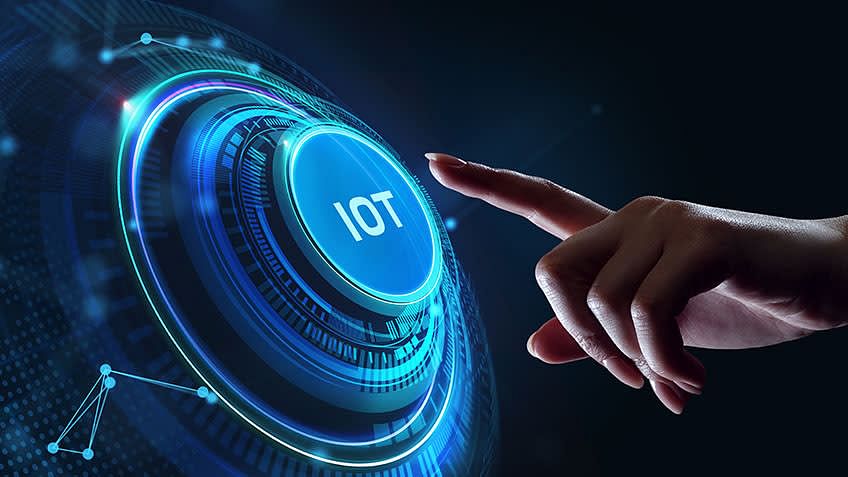
How are you reading this video right now? It might be on your smartphone, desktop, or tablet. Connecting devices to the Internet yields fantastic benefits. But what is the Internet of Things ?
In a nutshell, IoT is the concept of connecting any device to the internet and other connected devices. All instruments in the network interact with each other to collect and share data. Today, IoT is being used extensively to lessen the burden on humans. To name a few, IoT is deployed for Smart homes, Wearables (watches and bracelets), Smart Cars, Smart farming, Smart Retail, Smart Grids, Smart city, and smart healthcare.
With such a broad spectrum of applications, the future of IoT looks more promising than ever before. In this internet of things projects article, we bring you the top IoT projects of 2020. If you are a student, you could consider them for academic purposes or implement these purely out of interest.
Explore the most innovative IoT projects for 2024 with our all-inclusive guide! Our carefully chosen collection of projects highlights the most recent advancements in Internet of Things technology, ranging from industrial monitoring systems to smart home automation. Enroll in our Java course to gain the skills necessary for building amazing projects using the Java programming language and confidently explore the world of networked devices. With the help of our expert advice, realize your ideas and unleash the potential of IoT.
Now that you know what the Internet of Things is, continue reading to learn some easy yet exciting Internet of Things projects.
Smart Mirror
Smart money transfer.
- IoT based Smart arm
Smart Irrigation
Air monitoring system.
- IoT based Weather Reporting System
Smart Wheelchair
Smart street light system, smart agriculture system, home automation system, face recognition bot, air pollution monitoring system, smart parking system project, smart cradle system project, smart gas leakage detector bot, liquid level monitoring system, night patrol robot, health monitoring system.
We will now look at the first IoT project, the Smart mirrors. Smart mirrors are a very cool IoT application. It can be used to display the temperature, news, weather, calendar, clock, and compliments on a mirror. Apart from these, smart mirrors can be used for the following.
- Click the perfect selfies with a built-in camera.
- Installed with speakers to play some music and provide on-demand workout sessions from world-class trainers.
- Browse the internet, make phone calls, and even be connected with other devices for collaboration.

The next internet of things project is the Smart Money Transfer. We’re heading towards complete digitization. Transactions are made possible on your cell phone with apps like Apple pay, Google Pay, and Paypal. But imagine if you could walk to a store and pay with a wristwatch? Wouldn’t that be cool?
Some of its key features are as follows.
- Provides a comfortable and reliable platform for money transactions.
- It is compact, wearable, and rechargeable.
- For safety purposes, user authenticity is validated.
- This technology can reduce the burden of mobile money transfers.
- When you’re on the go, you could easily step into a store, purchase the goods and pay hassle-free.
- After every successful transaction, the balance is updated immediately to avoid any uncertainty.

Become a Software Development Professional
Full stack java developer masters program.
- Kickstart Full Stack Java Developer career with industry-aligned curriculum by experts
- Hands-on practice through 20+ projects, assessments, and tests
Full Stack Developer - MERN Stack Masters Program
- 40+ micro skilling exercises & 6+ work-like professional projects
- Develop expertise in 10+ full stack development tools and frameworks
Here's what learners are saying regarding our programs:
Mayur Kharad
Product engineer , iks health.
During the lockdown, I realized I needed to upskill myself, and my journey with Simplilearn has been fantastic. I learned many things during the full stack java developer course, thanks to trainer Virendra Sharma. I've always wanted to work in this sector, and after completing my certification in Fullstack Java Development, I got placed at IKS Health through Simplilearn.
Manish Maccha
Software engineer , solventek.
I was looking for a new job with a better salary and position, so I knew I needed to upskill. My experience with Simplilearn was very good. Each topic was innovative and interesting, with quality content. After completing the full stack java developer course, I landed a new job with Neo Geo Info Technologies with a 30% salary hike.
IoT based Smart Arm
This IoT project includes creating a robotic arm that can pick and place things from one place to another. To control this action, the robotic arm can be moved using specific commands. Some advanced arms allow the user to change the end effect of the arm to perform various actions. It can be used to make art, print 3D images, and build production lines. It can also be used to perform your day to day chores.
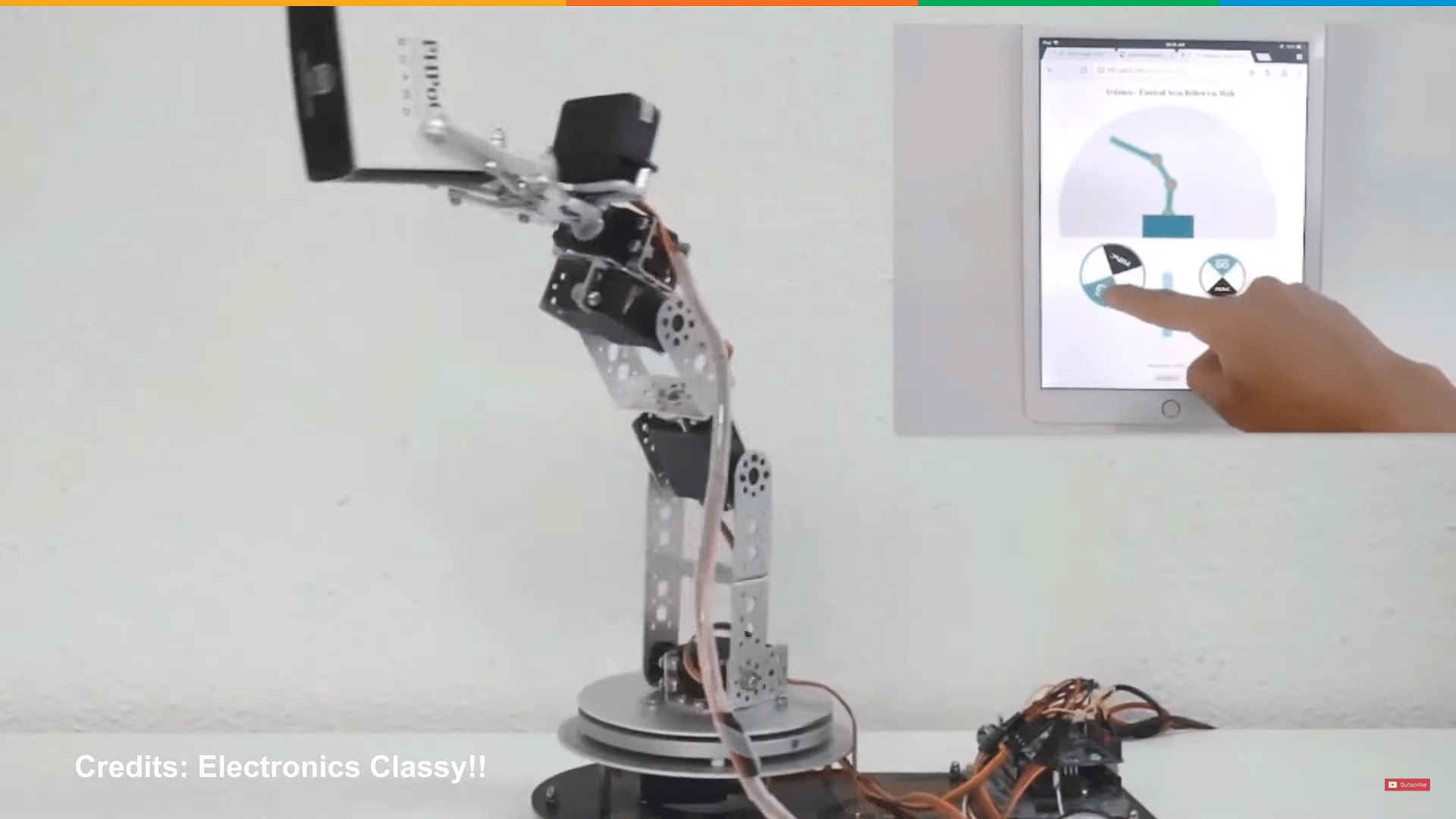
The next IoT project is smart irrigation. With the change in climate and recurrent water crisis, farmers suffer a great deal with growing crops. Smart irrigation puts an end to this ordeal. This system comes with a9 moisture sensor that checks the soil for its water content. When the soil moisture drops below a specific value, the system triggers the water supply.
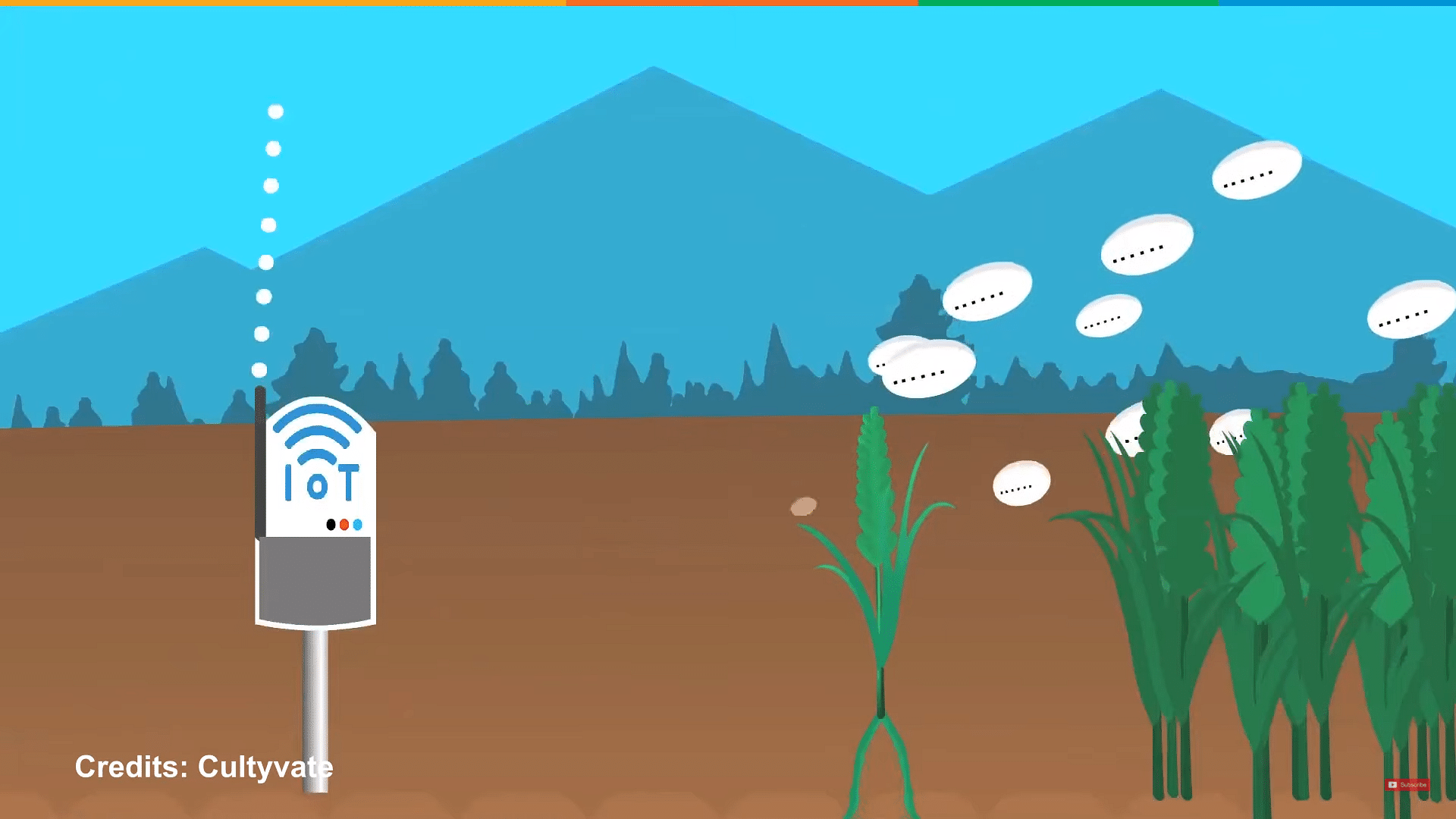
As the name suggests, this IoT project aims at creating smart doors that control the entry and exit of humans. These doors open and close automatically when you pass by. The door can also be controlled remotely. You could unlock the door for perhaps a friend, by tapping an icon on your smartphone. Once they exit, you’re immediately notified. The owner can also choose who has access to the door.
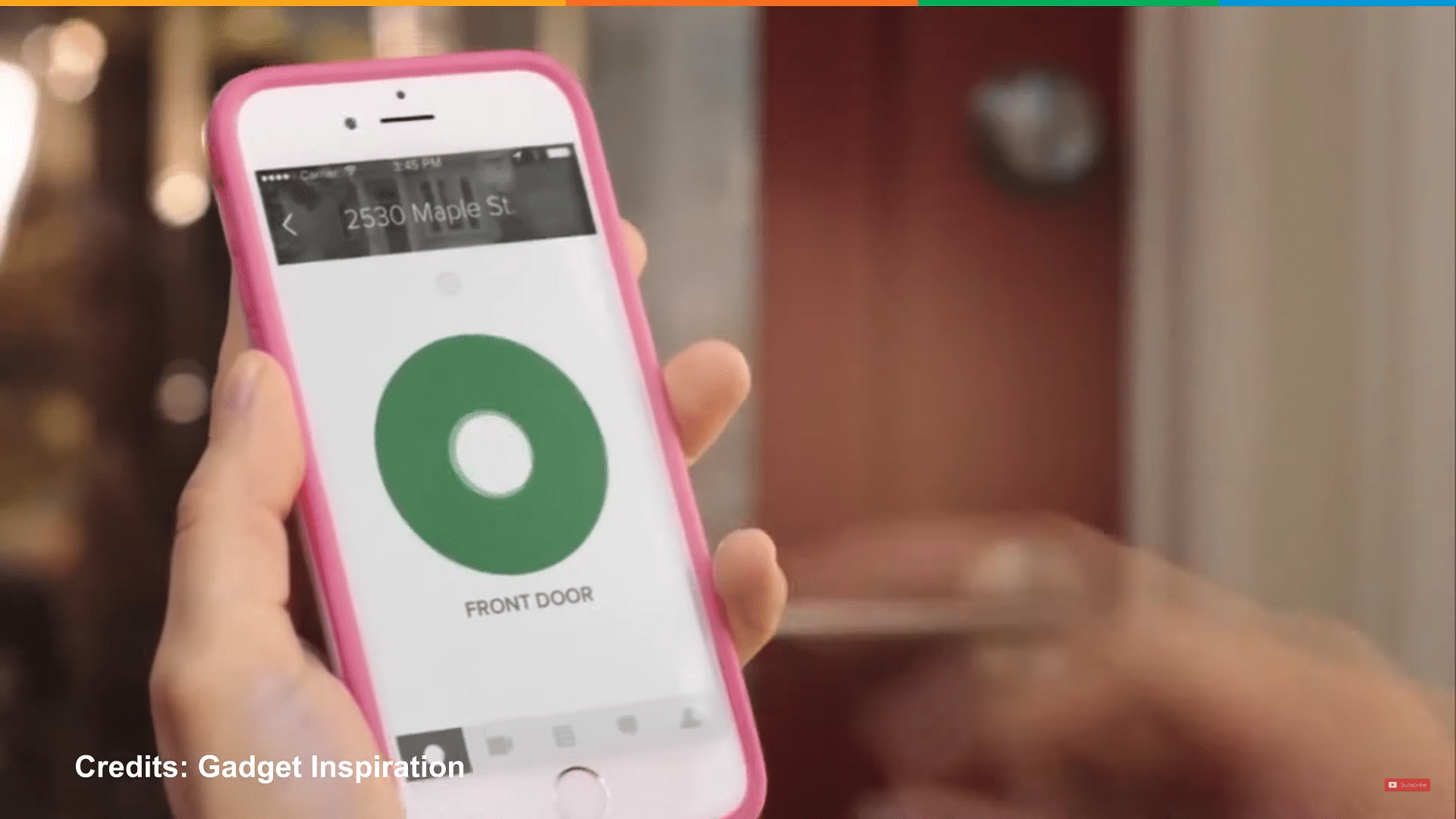
The next internet of things project is the air monitoring system. Air monitoring has become crucial for the environment, and what better way to do it than incorporating IoT. The IoT system uses air sensors to sense the presence of harmful gases/compounds in the air. The data collected can be used by the local authorities to make a detailed analysis. Necessary actions can be taken to ensure that the air quality levels don’t reach an extreme low, especially in areas around hospitals and schools.
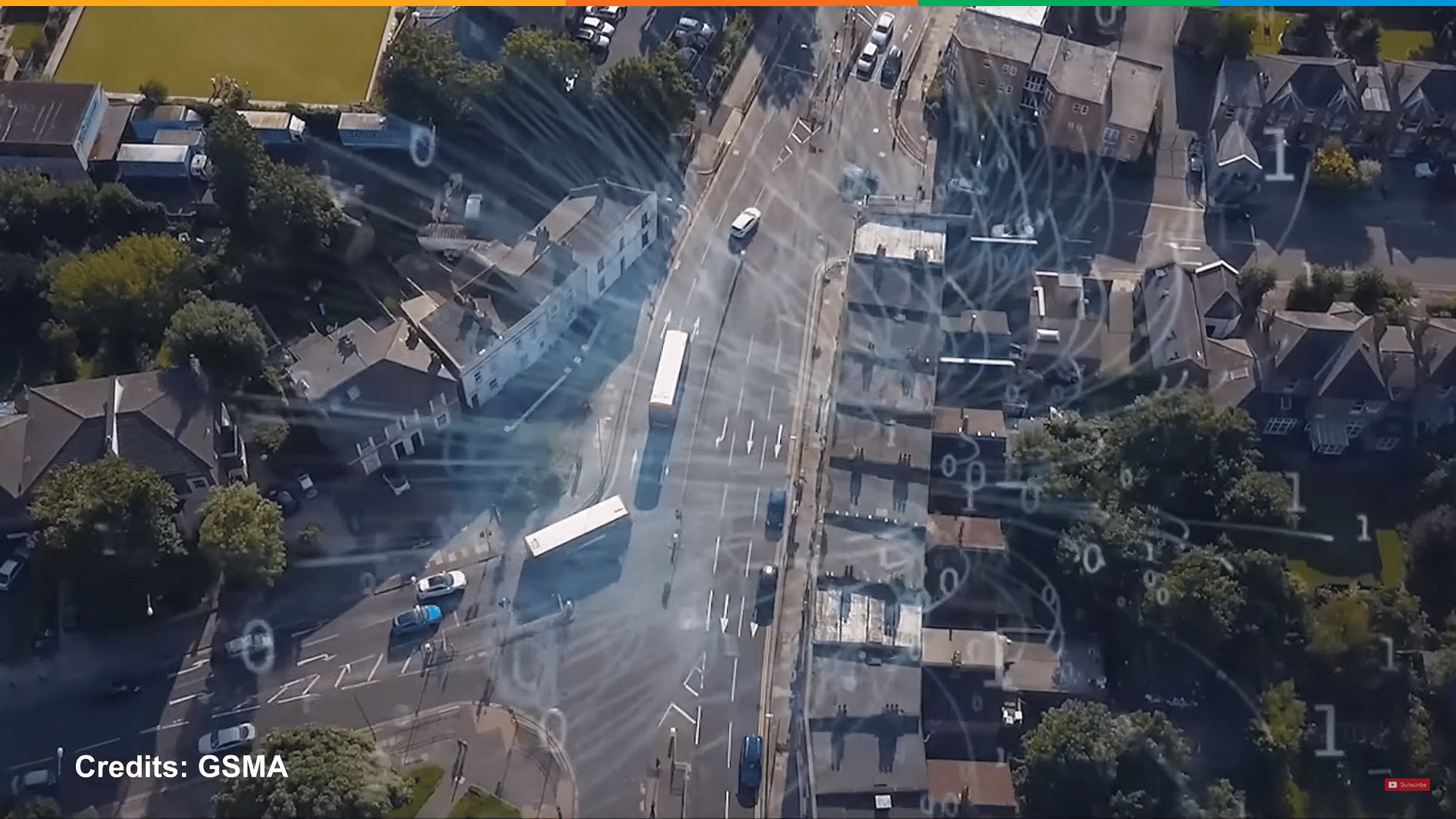
The next internet of things project is the smart alarm clock. There are many variations of a smart alarm clock, but the alarm we are talking about is a self-setting alarm clock. This smart alarm clock uses your Google calendar appointments to set alarm times. It can also procure data from GPS about your ETA to a place and the weather app to automatically adjust your wake time.

We will now look at the next internet of things project.
IoT Based Weather Reporting System
The system deals with monitoring weather and climate changes like humidity, temperature, moisture, wind speed, UV radiation, light intensity, and even carbon monoxide levels in the air; using multiple sensors.
- These installed sensors send the data to the web page that is plotted as graphical statistics.
- The project even consists of an application that sends notifications as an effective alert system to warn people about sudden and drastic weather changes.
- If you’re heading out, the app could quickly tell you what the weather will be like and suggest carrying an umbrella or perhaps a sunblock.

The next IoT project is the smart wheelchair. There are over 132 million wheelchair users across the globe. Smart wheelchairs are an excellent innovation. Typically it comes with built-in sensors on the seats that collect data every second. The data provides insight into the patient's seating behavior and the energy required to maintain the posture. Other variations of the smart wheelchairs could include fall detection. These features allow people to monitor the patient from a remote location.
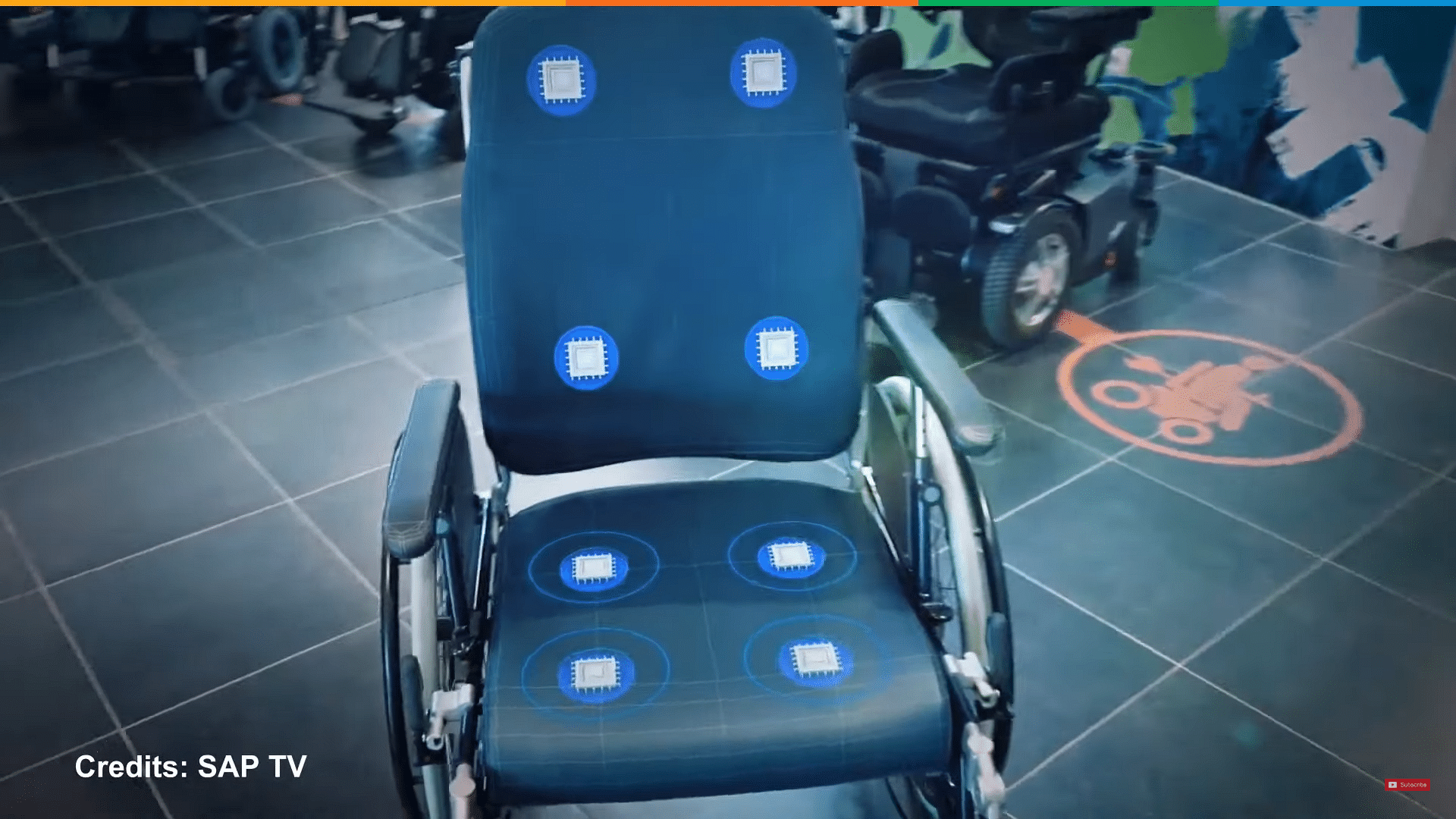
We will now look at the next IoT project, smart street light system.
- This IoT-based street light monitoring system monitors and ensures low power consumption and detects faulty lights.
- The street lights have external sensing that automatically turns on at the desired intensity based on the lighting needed.
- Control of light intensity is based on the movement of people or vehicles.
- In case of emergency, the lights increase the brightness to maximum intensity thereby ensuring safety.
- When deployed as a part of a smart city, the users can be informed about any outages. They can also register a complaint about immediate service.
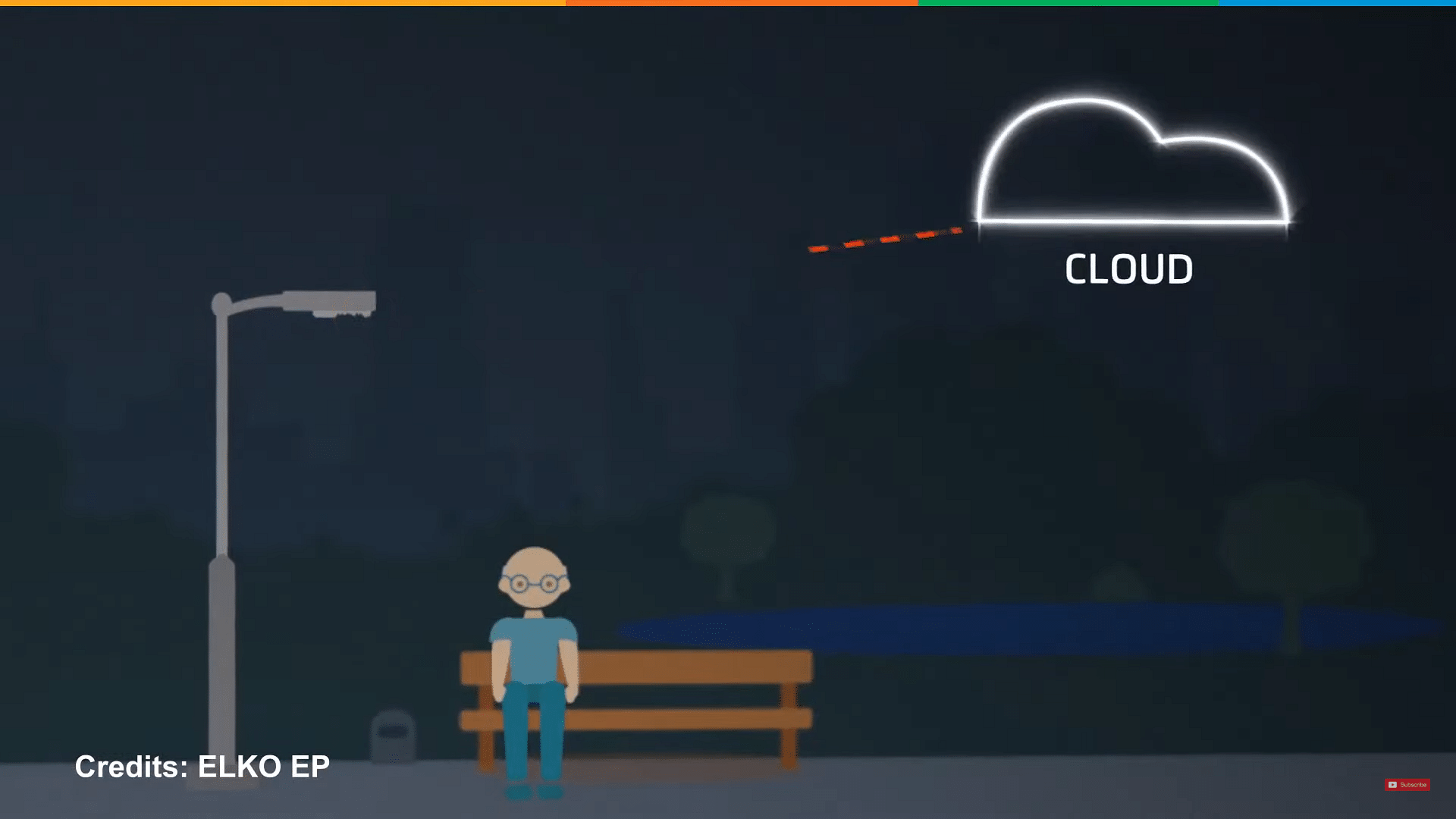
The smart agriculture system is one of the best IoT project ideas for students. This project aims to develop an advanced agricultural system to automate and monitor various farming tasks. For example, the system can be programmed to automatically irrigate a piece of land, spray fertilizers or pesticides on crops wirelessly, and monitor soil moisture through a moisture-sensing system. With such an advanced system, farmers can focus on manual-intensive tasks and increase productivity. Learners can also implement a similar IoT project to monitor house gardens or indoor plants.
The smart agriculture system offers several benefits, including real-time updates, increased productivity, remote management, timely monitoring, a data-centric approach, reduced operational costs, time efficiency, ease of use, and accuracy.
Smart agriculture involves several key factors, such as smart contracts, supply chain management , analytics, soil and climate monitoring, sensors, research, and storage. These factors improve transparency and efficiency in transactions, optimize farming practices, and ensure optimal crop growth conditions.
The home automation system is a popular IoT project that aims to automate household appliances and objects over the internet. With a touch-based interface, the project uses a Wi-Fi connection, a microcontroller, and inbuilt touch-sensing input pins to remotely control and manage household appliances. The microcontroller is integrated with the Wi-Fi modem to receive commands from the user via the internet. In addition, the system status is displayed on an LCD screen for easy monitoring.
A home automation system offers several benefits, including energy efficiency, convenience, and cost-effectiveness. It provides users remote access to control home appliances and monitor energy usage. In addition, it allows for centralized management, customisation, and constant monitoring.
In-demand Skills:
Students can learn programming, electronics, and IoT skills for home automation projects. You can also learn about smart contracts, blockchain, and cloud computing.
Face recognition bot is an Artificial Intelligence (AI) and Computer Vision-based project that uses deep learning algorithms to identify and recognise human faces. This project uses a camera to capture images, which an AI model then processes to detect faces and match them with existing images in the database. The face recognition bot is designed to work in real-time, making it ideal for security purposes, attendance management, and other applications that require fast and accurate identification of individuals.
Key Components:
- Deep learning algorithms
- Increased security and safety
- Efficient attendance management
- Accurate identification of individuals
- Timesaving and convenience
- Reduces human error
Applications:
- Security systems
- Attendance management systems
- Public safety and law enforcement
- Access control systems
- Personalized marketing and customer experience
- Computer vision
- Deep learning
- Python programming
- Image processing
- Data analysis
The air pollution monitoring system is an IoT-based project that measures air quality in real-time. This system consists of sensors that detect and measure different pollutants in the air, such as particulate matter, carbon monoxide, and nitrogen dioxide. The data collected by the sensors is sent to a central database, which users can access and analyze in real-time.
These are some of the advantages of this system:
- Timely monitoring of air quality.
- Data-centric analysis of pollution levels.
- Accurate measurement of different pollutants.
Components:
The main components of the air pollution monitoring system include sensors, a microcontroller, and a database. The sensors detect and measure different pollutants in the air while the microcontroller collects and sends this data to the database for analysis. Users can access the database through a web or mobile application to monitor air quality in real time.
The air pollution monitoring system can be used in various applications, such as industrial settings, smart cities, and residential areas. It can help authorities to monitor air pollution levels in real time and take necessary measures to reduce pollution. Individuals can also use it to monitor air quality in their homes, workplaces, and communities.
One of the most significant problems faced by urban areas is parking management. A smart parking system is an IoT-based project that can efficiently manage parking spaces and improve traffic flow. It utilizes sensors, cameras, and other IoT devices to gather data and manage parking spots, providing real-time information to drivers.
The benefits of a smart parking system include efficient use of parking spaces, reduced congestion and pollution, improved safety, and reduced operational costs. It can also save drivers time and provide a better parking experience.
The smart parking system employs various sensors such as ultrasonic, magnetic, or camera-based to detect the availability of parking spaces. These sensors send the data to a central server that uses machine learning algorithms to analyze and optimize the available parking spots. Drivers can access this information through a mobile app that provides real-time updates on parking availability, location, and pricing.
The critical factors of a smart parking system include data analysis, real-time updates, user experience, smart sensors, and machine learning. Integrating these factors helps provide an efficient parking system that can enhance the overall parking experience for drivers.
Smart cradle system is an innovative IoT-based project that aims to provide a more efficient and effective way to care for infants. This system utilizes various IoT components, such as sensors and microcontrollers, to monitor and control the infant's environment. For example, it can scan the baby's temperature, humidity, and movements and alert the parents or caretakers in case of abnormalities. The system can also provide soothing sounds and vibrations to help the baby fall asleep.
The smart cradle system can benefit the baby and the parents/caretakers. It can ensure the baby's safety and comfort by constantly monitoring and regulating the environment. The system can also reduce the stress and workload for the parents/caretakers by providing automated functions, such as sleep-inducing sounds and movements. In addition, the system can improve sleep quality for both the baby and the parents/caretakers.
The smart cradle system has various features, making it an efficient and user-friendly IoT-based project. It includes sensors to monitor the baby's temperature, humidity, movements and microcontrollers to process and analyze the data. The system can also generate soothing sounds and vibrations to help the baby sleep. Additionally, the system can be controlled remotely via a smartphone application, providing convenience and flexibility for the parents/caretakers.
The smart cradle system can be used in various settings, such as homes, daycares, and hospitals. It can provide a safe and comfortable environment for infants, ensuring their well-being and reducing the workload of the parents/caretakers. The system can also be customized to meet the specific needs of the users.
Gas leakage is a significant concern and can lead to harmful and sometimes fatal consequences. The Smart Gas Leakage Detector Bot is an Internet of Things (IoT) based project that detects gas leaks and alerts users. The project uses a gas sensor that detects gas leakage and triggers an alarm. The bot can also be programmed to turn off the gas valve automatically to prevent further leakage and reduce the risk of an explosion. This project is instrumental in homes, industries, and laboratories where gas leaks can occur.
The Smart Gas Leakage Detector Bot is an efficient way to detect and prevent gas leaks. It helps to keep the environment safe and reduces the risk of harm or injury. The benefits of this project include real-time gas detection, remote monitoring, automatic gas valve control, and easy installation. It can also save lives, prevent property damage, and reduce the cost of repair.
The Smart Gas Leakage Detector Bot uses a gas sensor, a microcontroller, a Wi-Fi module, and a motorized valve. The gas sensor detects the gas leakage and sends a signal to the microcontroller, which processes the data and triggers an alarm. The Wi-Fi module allows for remote monitoring and control, while the motorized valve automatically shuts off the gas valve.
The Smart Gas Leakage Detector Bot can be used in various applications, including homes, industries, and laboratories. It is beneficial in areas where gas leaks can occur, such as near gas pipelines, gas storage tanks, and gas-powered appliances. The bot can also be integrated with a smart home system for more efficient management.
A liquid level monitoring system is an IoT-based project that allows users to remotely monitor the liquid level in a container. This system is beneficial in industries where liquids are stored in large containers or tanks, such as chemical plants or oil refineries. The system uses ultrasonic sensors to measure the liquid level and transmit the data to a microcontroller. The microcontroller processes the data and sends it to a web server via the internet. Users can then access the data from a web browser or mobile app and receive real-time updates on the liquid level.
The benefits of a liquid-level monitoring system include increased efficiency, cost-effectiveness, and improved safety. By monitoring the liquid level in a container, users can avoid overfilling or underfilling, which can result in costly spills or damage to equipment. The system can also track liquid usage, enabling users to optimize their processes and reduce waste. Additionally, the system can provide early warning of leaks or other issues, allowing for timely intervention and improved safety.
The components of a liquid-level monitoring system include:
- Ultrasonic sensors.
- A microcontroller.
- A Wi-Fi or Ethernet module.
- A web server or cloud platform.
Liquid-level monitoring systems have applications in various industries, including chemical plants, oil refineries, water treatment plants, and food and beverage manufacturing. They can monitor the level of chemicals, oil, water, or other liquids in large containers or tanks. The systems can also be integrated with other IoT devices or methods, such as industrial automation or predictive maintenance, to improve overall efficiency and productivity.
The Night Patrol Robot project involves designing and building a robot that can monitor a specific area or location during the night. This IoT-based robot can detect and report suspicious activity or movement and even alert the authorities if necessary.
The robot uses sensors, cameras, and an IoT communication system to monitor and report unusual activity. It can also move autonomously and efficiently, covering a large area. In addition, the robot can be controlled remotely through a smartphone or computer, providing real-time video and audio feed to the user.
The benefits of the Night Patrol Robot project include increased security and safety in areas that are vulnerable to crime or other threats. It also offers a cost-effective and efficient solution for nighttime surveillance, eliminating the need for human patrols.
Healthcare is one of the most promising applications of the Internet of Things (IoT). The Health Monitoring System is a cutting-edge IoT-based project that allows healthcare professionals to monitor and manage patient health remotely. The project uses sensors and wearable devices to collect real-time vital health data transmitted to healthcare providers online.
The components of the Health Monitoring System include wearable devices, sensors, data processing units, and a cloud-based data storage and management system. The wearable devices have sensors that collect health data, including heart rate, blood pressure, oxygen levels, and temperature. The data is then processed by a data processing unit and transmitted to a cloud-based data storage and management system.
The Health Monitoring System offers many benefits to patients and healthcare providers alike. It allows real-time patient health monitoring, enabling healthcare providers to intervene quickly in a health emergency. It also improves the efficiency of healthcare delivery by reducing the need for in-person consultations and enabling remote consultations. Patients can also benefit from personalized healthcare, as the system can provide tailored healthcare recommendations based on individual health data.
The Health Monitoring System can be used in various healthcare applications, including remote patient monitoring, chronic disease management, and elderly care.
We hope this article on IoT Projects gave you an insight into the possible innovations with IoT. If you wish to learn IoT and perhaps make a career out of it, then the Full Stack Java Developer will come in handy.
The primary objective of this is to give you insights into the bright and exciting future of Big Data. The course will familiarize you with IoT concepts, their origin, impact, methodologies and tools, and how IoT is integrated into business applications to improve business results.
Our Software Development Courses Duration And Fees
Software Development Course typically range from a few weeks to several months, with fees varying based on program and institution.
| Program Name | Duration | Fees |
|---|---|---|
| Cohort Starts: | 4 Months | € 2,499 |
| Cohort Starts: | 7 months | € 1,500 |
| Cohort Starts: | 6 Months | € 1,500 |
| 7 months | € 1,099 |
Get Free Certifications with free video courses
Software Development
Getting Started with Full Stack Java Development
Full-Stack Development 101: What is Full-Stack Development ?
Learn from Industry Experts with free Masterclasses
Must-Know Full Stack Java Dev Career Trends for 2024
Full Stack Java Development: A 2024 Blueprint for Recession-Proofing Your Career
Java FullStack: Your Gateway to a Recession-Proof Future?
Recommended Reads
An Introduction to Project Management: A Beginner’s Guide
Real-World IoT Applications in 2024
The Best Guide on the Internet to Know About the Top 5 C# Projects
Project Management Interview Guide
Top 35 IoT Terms You Need to Know
The Top 10 Awesome Arduino Projects of All Time
Get Affiliated Certifications with Live Class programs
- PMP, PMI, PMBOK, CAPM, PgMP, PfMP, ACP, PBA, RMP, SP, and OPM3 are registered marks of the Project Management Institute, Inc.

IMAGES
VIDEO
COMMENTS
An AI-driven approach to proactive Internet Of Things (IoT) based systems. The Internet of Things (IoT) refers to the ever-growing network of physical objects such as smart devices, vehicles, buildings and other items embedded with electronics, software, sensors, actuators, and network connectivity that enable these objects to interact ...
Trending Research Proposal in Internet of Things (IoT) for PhD. The IoT permits interconnection between physical and virtual smart devices through the Internet. The IoT devices are generally tiny in size and have low power with limited processing capabilities. The devices sense the environmental-related information and forward the sensed ...
The Internet of Things (IoT) is a vast network of physical objects that exchange data with over devices over the internet. These include everything from household items like fitness trackers and thermostats to industrial technologies such as power grids and digital supply chains. PhD candidates in the IoT might study how to expand of improve ...
Enhanced Deep Learning and Semantic-based Predictive Analytics for Reactive IoT Applications and Streaming Data. Edinburgh Napier University School of Computing, Engineering & the Built Environment. The emergence of Internet of Things (IoT) has formed a bridge that connects most of the real-world entities with the related computer entities.
The document discusses security issues related to big data in Internet of Things applications. It proposes a PhD research project to address these issues. Specifically, it will examine data-intensive IoT applications like smart homes, cities, healthcare, environment and agriculture. These applications generate huge amounts of data but also raise privacy and security concerns when data is ...
paper, we identify 10 key research topics and discuss the research. problems and opportunities within these topics. Index T erms —Internet of Things, Energy Harvesting, Rec-. ommendation, Search ...
The Center of Excellence in Internet of Things (ACEIoT) at UR-College of Science and Technology held the second Doctoral Committee (DC) to hear from 13 PhD students defending their research proposals. 13 PhD students were enrolled in the Centre's second cohort since September 2018. Each PhD student has been working with her/his PhD Research ...
two categories, namely, i) General challenges: which. include common challenges between IoT and traditional. network such as communication, heterogeneity, QoS, scalability, virtualization, data ...
1. Novel Ideas. Novelty is essential for a PhD degree. Our experts are bringing quality of being novel ideas in the particular research area. It can be only determined by after thorough literature search (state-of-the-art works published in IEEE, Springer, Elsevier, ACM, ScienceDirect, Inderscience, and so on).
1.4. Aim and Objectives. Based on the identified research and literature gaps, the main purpose of this doctorate project is to explore the role of IoT in transforming the business model in the context of SMEs. The research objectives are: To examine the key elements of the IoT landscape and connections between them.
Admission requirements & Required Documents for Msc in IoT. Students reporting. Rapid Prototyping. Blockchain Fundamentals and Applications. Drone fundamentals and applications. LoRA technologies. IEEE GRSS Drone Sensor Deployment. ACEIoT's aims to, develop curricula to promote cutting-edge research in the field of IoT; train high-level ...
Abstract. The research of this Ph.D. is fulfilled in the context of the optimized monitoring of Internet of Things (IoT) networks. The IoT enables the interconnection of billions of sensors, ac- tuators, even humans to the Internet, creating a wide range of services, some of which are mission-critical.
The Internet of Things (IoT) is a rapidly growing emerging topic of technical, social, and economic ... incompatible proposals for the practical realization of IoT systems (Fell, 2014; Zanella et al., 2014). Furthermore, the adoption of the IoT paradigm is also hampered by the lack of a clear and widely accepted business model that can attract ...
In this PhD project, the successful candidate will explore the current state of the art on software architecture and Internet Of Things and then develop a new approach to endorsing the proactive learning ability to the IoT and therefore enable these smart systems to provide resilient and adaptive services that best match the dynamically ...
FindAPhD. Search Funded PhD Projects, Programmes & Scholarships in Computer Science, Internet Of Things, proposal. Search for PhD funding, scholarships & studentships in the UK, Europe and around the world.
IoTfy. MATLAB. BevyWise IoT simulator. NetSim. NS-2 and NS-3. Ansys IoT simulator. And also OMNet++. PhD Research Topics in IoT Internet of Things will serve the best works in your plate. We aim to upkeep your PhD research from the start to the end.
Phd Thesis Proposal For Computer Science Students. Phd Research Topics In Internet Computing. Phd Thesis Proposal Topics For Information Technology. Phd Research Topics In Iot Internet Of Things. Phd Thesis Proposal Topics In Information Technology. Phd Research Topics In Iot Mqtt. Phd Thesis Research Paper Assistance
5G Communication. Fault-Tolerant Routing. Elimination of Data Redundancy. Context-aware Networks. Network Slicing. Wireless Multimedia Systems. Peer-to-peer and Overlay Networks. At this moment, almost we complete our 18+ years of service for PhD Research Topics in IoT. However, we are always relentless like a storm to serve all of your needs.
The Internet of things and its collaborative technologies such as 5G, cloud, artificial intelligence, analytics, and automation will allow people and objects/devices to communicate not only with each other but with any thing at any time and any where using the internet. Nowadays, people interact with different smart
Search Funded PhD Projects, Programmes & Scholarships in Computer Science, Internet Of Things in USA. Search for PhD funding, scholarships & studentships in the UK, Europe and around the world. ... PhD thesis PhD interview questions PhD research proposal Contacting potential PhD supervisors PhD blog Our editorial team View all advice guides.
PhD Thesis on Internet of Things is a bridge between your goal and our completion. Internet of Things refers to IoT, which connects 1000's of smart devices via Internet. Thesis writing in this field is not new for us since we served nearly 2000+ thesis for the PhD students. Our help to you is the easiest key to unlock your PhD success.
Written by Mark Bennett. You'll need to write a research proposal if you're submitting your own project plan as part of a PhD application. A good PhD proposal outlines the scope and significance of your topic and explains how you plan to research it. It's helpful to think about the proposal like this: if the rest of your application explains ...
Gas leakage is a significant concern and can lead to harmful and sometimes fatal consequences. The Smart Gas Leakage Detector Bot is an Internet of Things (IoT) based project that detects gas leaks and alerts users. The project uses a gas sensor that detects gas leakage and triggers an alarm.